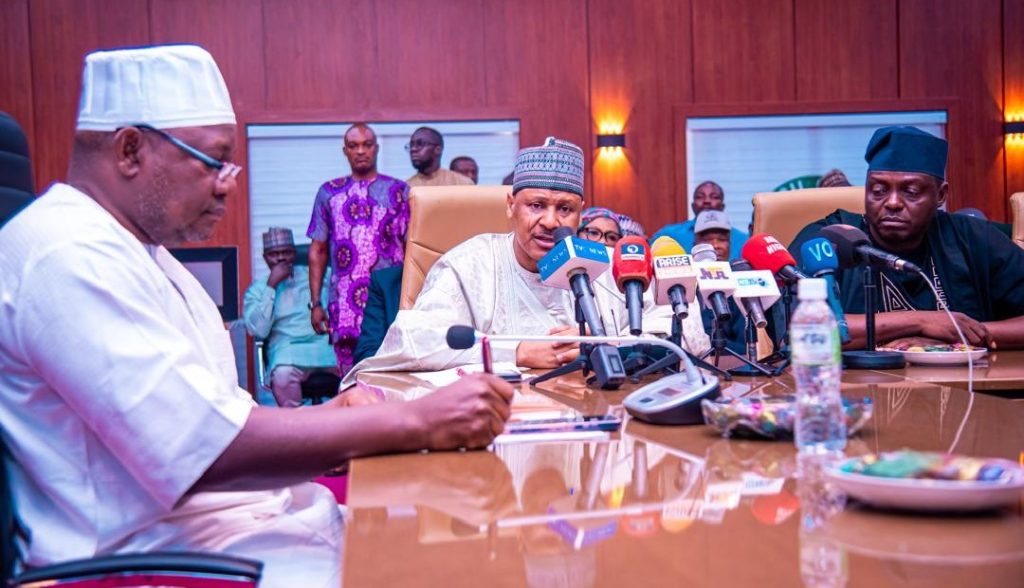Nigeria, having celebrated 26 years of restored democratic governance, stands at a critical juncture in its journey towards economic revitalization and the strengthening of democratic principles. Mohammed Idris, the Minister of Information and National Orientation, has affirmed the Federal Government’s unwavering dedication to these twin goals, emphasizing the significance of President Bola Tinubu’s reform agenda as a cornerstone of this transformative process. This agenda, encompassing bold policy shifts such as the removal of fuel subsidies and the unification of foreign exchange rates, has been positioned as essential, albeit challenging, steps towards achieving long-term economic stability and sustainable growth.
The removal of fuel subsidies, a long-standing practice that had become a significant drain on national resources, and the unification of foreign exchange rates, aimed at addressing distortions in the currency market, represent significant departures from previous economic policies. While acknowledging the initial turbulence caused by these reforms, Minister Idris likened the situation to an aircraft taking off, experiencing temporary instability before achieving cruising altitude. He highlighted indicators of economic recovery, referencing observations by the World Bank that point to Nigeria’s return to growth levels not seen in over a decade as evidence of the efficacy of these reforms. He further emphasized the government’s commitment to utilizing the savings accrued from the removal of fuel subsidies for strategic investments in critical infrastructure projects, signifying a shift towards a more sustainable and impactful use of national resources.
Central to the government’s economic renewal strategy is the investment in major infrastructure development, particularly in the transportation sector. The construction of two extensive highway corridors, spanning over 1,700 kilometers, is a key component of this strategy. These corridors are designed not just to enhance physical connectivity but to serve as catalysts for economic growth and development, bridging regional disparities and facilitating the movement of goods and people. The goal, as articulated by Minister Idris, is to transform these infrastructure projects into arteries of economic opportunity, driving growth and fostering greater integration across various regions of the country.
Beyond the immediate economic impact, these infrastructural investments carry a broader significance. They represent a tangible manifestation of the government’s commitment to long-term development and its recognition of the vital role of infrastructure in driving economic progress. By investing in these projects, the government is aiming to create a more enabling environment for businesses to thrive, attract foreign investment, and create jobs, thus contributing to a more robust and diversified economy. This approach reflects a strategic vision that prioritizes sustainable development and seeks to lay a foundation for long-term economic prosperity.
The government’s reform agenda, as championed by President Tinubu, extends beyond purely economic considerations. Under the banner of the “Renewed Hope Agenda,” the reforms aim to build a more inclusive and sustainable growth trajectory, fostering accountability and good governance. This broader perspective underscores the interconnectedness of economic progress and democratic consolidation, recognizing that sustainable development requires not only sound economic policies but also a strong commitment to democratic principles, inclusivity, and transparency. The reforms, therefore, are intended to create an environment where economic opportunities are more equitably distributed, and the benefits of growth are shared more widely across the population.
In this broader context, the Democracy Day celebrations serve as a poignant reminder of the journey Nigeria has undertaken since its return to democratic rule. It offers an opportunity to reflect on the progress made, acknowledge the challenges that remain, and reaffirm the nation’s commitment to democratic ideals. The government’s reform agenda, with its focus on economic revitalization and democratic consolidation, is presented as a roadmap for the future, charting a course towards a more prosperous and democratic Nigeria. It represents a renewed commitment to building a nation where economic opportunities are abundant, democratic values are upheld, and the promise of a brighter future is within reach for all citizens.


